POPLPRAC 761: Mental Health in Old Age - A Report on ECT Efficacy
VerifiedAdded on 2023/06/07
|12
|3254
|482
Report
AI Summary
This report examines the effectiveness of electroconvulsive therapy (ECT) in treating mental health disorders in older adults. It discusses the increasing prevalence of mental health issues like depression and dementia in the aging population and evaluates ECT as a treatment option, considering its physiological, psychological, socio-political, and epidemiological implications. The report highlights the refinement of ECT techniques over the years, making it a safer option for elderly patients with severe mental disorders who may not respond to pharmacotherapy. It also addresses potential side effects, ethical considerations, and legal provisions surrounding ECT administration, particularly in New Zealand, while emphasizing the importance of informed consent and adherence to professional guidelines. Desklib offers a platform for students to access similar solved assignments and study resources.
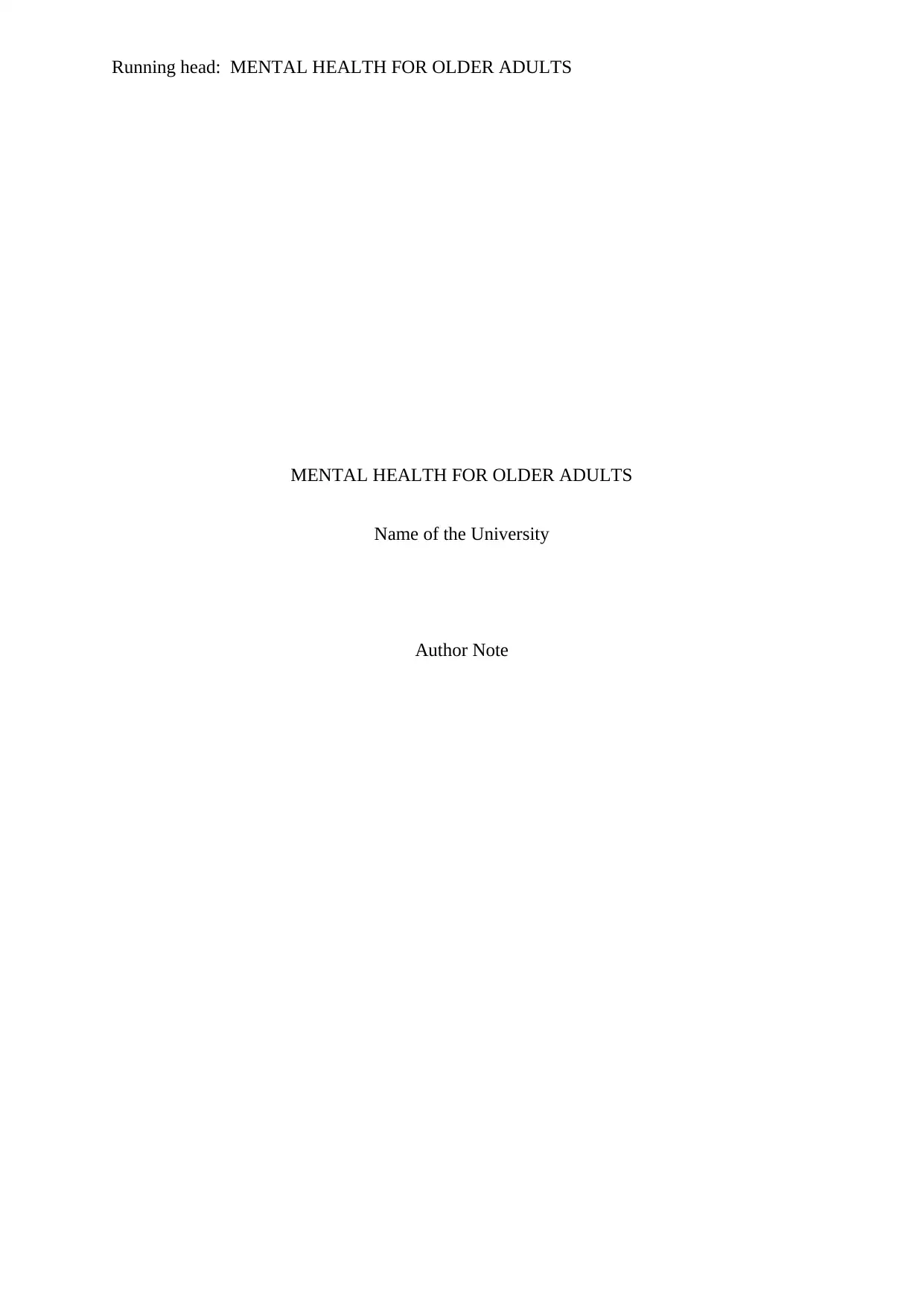
Running head: MENTAL HEALTH FOR OLDER ADULTS
MENTAL HEALTH FOR OLDER ADULTS
Name of the University
Author Note
MENTAL HEALTH FOR OLDER ADULTS
Name of the University
Author Note
Paraphrase This Document
Need a fresh take? Get an instant paraphrase of this document with our AI Paraphraser
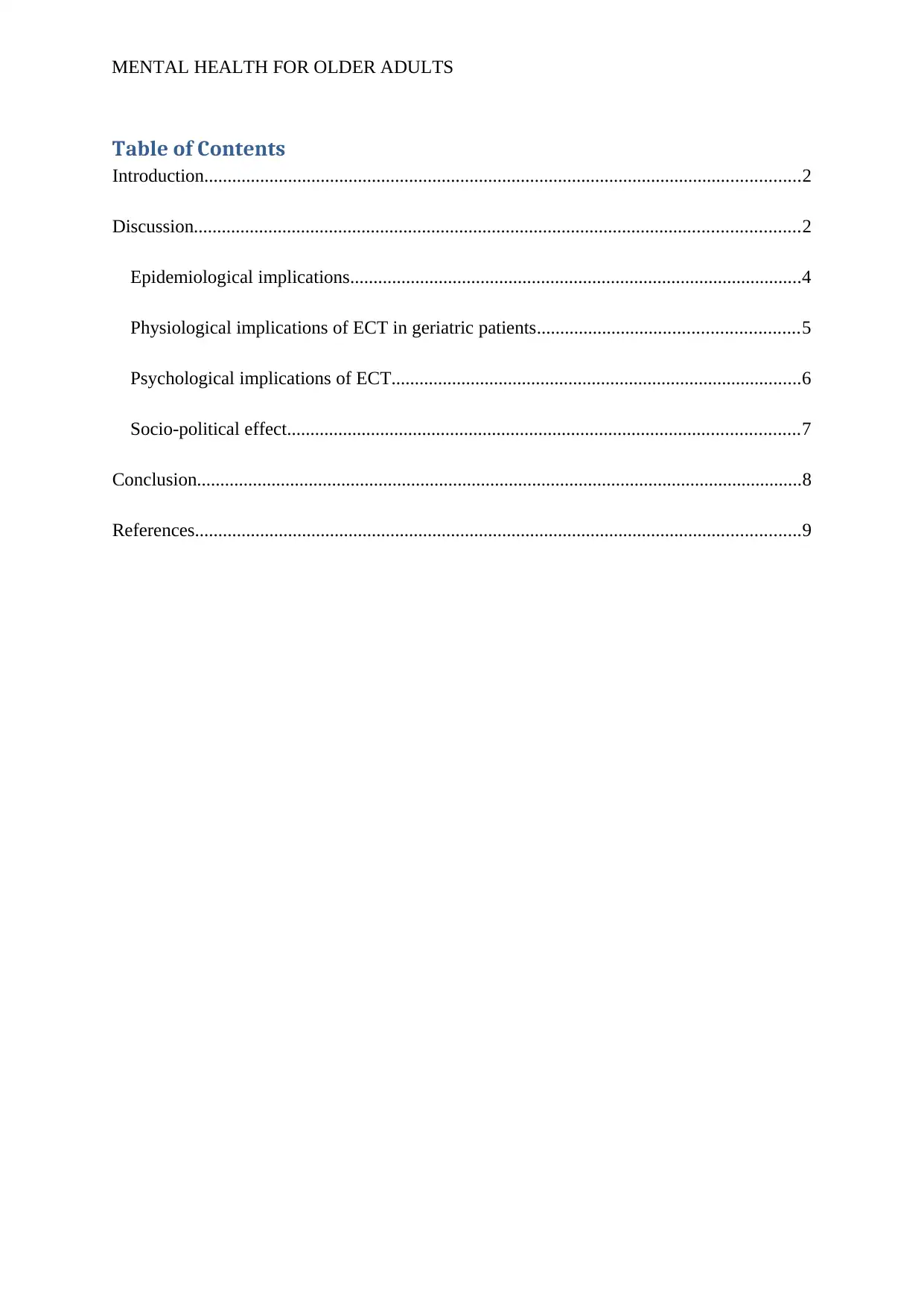
MENTAL HEALTH FOR OLDER ADULTS
Table of Contents
Introduction................................................................................................................................2
Discussion..................................................................................................................................2
Epidemiological implications.................................................................................................4
Physiological implications of ECT in geriatric patients........................................................5
Psychological implications of ECT........................................................................................6
Socio-political effect..............................................................................................................7
Conclusion..................................................................................................................................8
References..................................................................................................................................9
Table of Contents
Introduction................................................................................................................................2
Discussion..................................................................................................................................2
Epidemiological implications.................................................................................................4
Physiological implications of ECT in geriatric patients........................................................5
Psychological implications of ECT........................................................................................6
Socio-political effect..............................................................................................................7
Conclusion..................................................................................................................................8
References..................................................................................................................................9
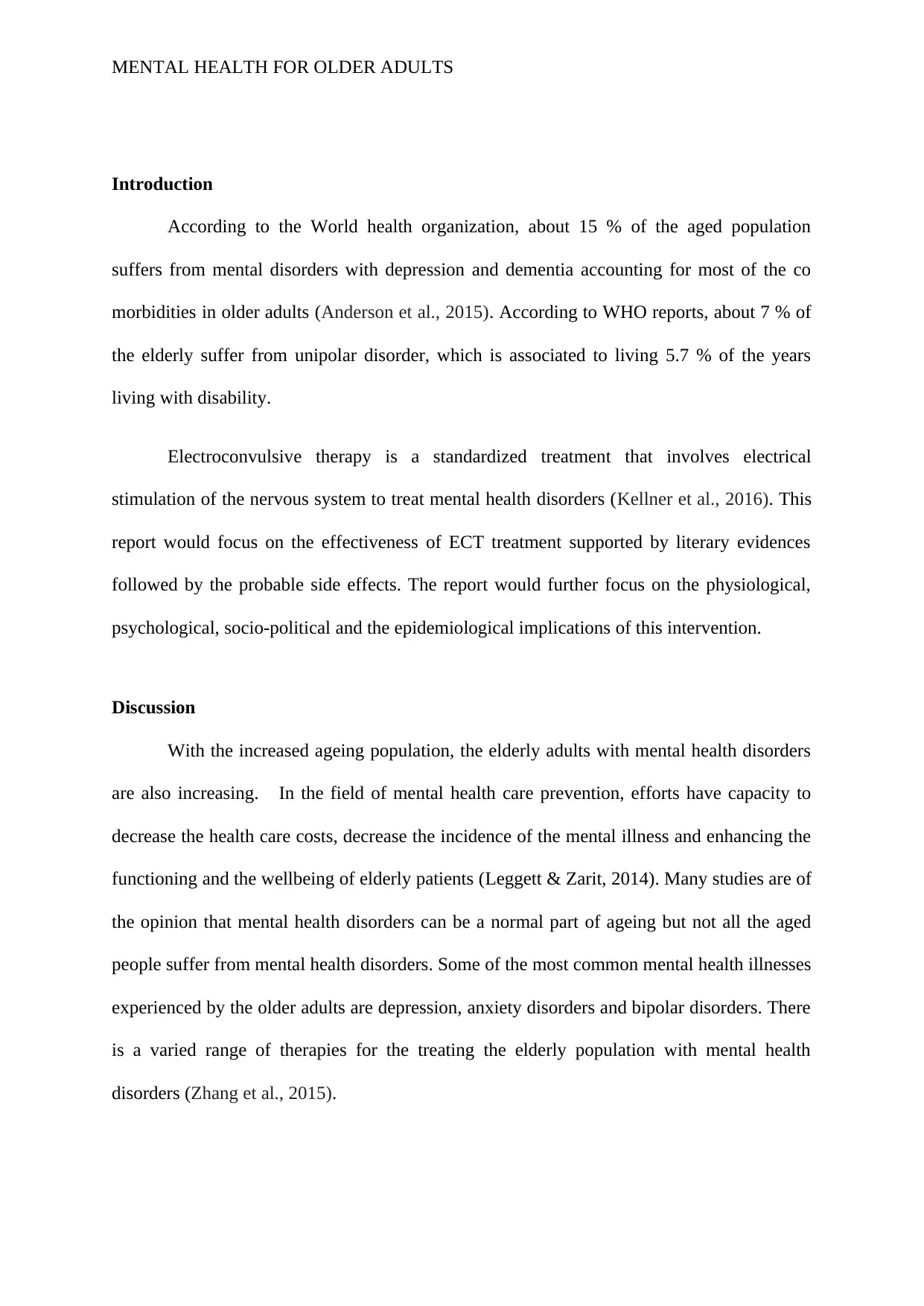
MENTAL HEALTH FOR OLDER ADULTS
Introduction
According to the World health organization, about 15 % of the aged population
suffers from mental disorders with depression and dementia accounting for most of the co
morbidities in older adults (Anderson et al., 2015). According to WHO reports, about 7 % of
the elderly suffer from unipolar disorder, which is associated to living 5.7 % of the years
living with disability.
Electroconvulsive therapy is a standardized treatment that involves electrical
stimulation of the nervous system to treat mental health disorders (Kellner et al., 2016). This
report would focus on the effectiveness of ECT treatment supported by literary evidences
followed by the probable side effects. The report would further focus on the physiological,
psychological, socio-political and the epidemiological implications of this intervention.
Discussion
With the increased ageing population, the elderly adults with mental health disorders
are also increasing. In the field of mental health care prevention, efforts have capacity to
decrease the health care costs, decrease the incidence of the mental illness and enhancing the
functioning and the wellbeing of elderly patients (Leggett & Zarit, 2014). Many studies are of
the opinion that mental health disorders can be a normal part of ageing but not all the aged
people suffer from mental health disorders. Some of the most common mental health illnesses
experienced by the older adults are depression, anxiety disorders and bipolar disorders. There
is a varied range of therapies for the treating the elderly population with mental health
disorders (Zhang et al., 2015).
Introduction
According to the World health organization, about 15 % of the aged population
suffers from mental disorders with depression and dementia accounting for most of the co
morbidities in older adults (Anderson et al., 2015). According to WHO reports, about 7 % of
the elderly suffer from unipolar disorder, which is associated to living 5.7 % of the years
living with disability.
Electroconvulsive therapy is a standardized treatment that involves electrical
stimulation of the nervous system to treat mental health disorders (Kellner et al., 2016). This
report would focus on the effectiveness of ECT treatment supported by literary evidences
followed by the probable side effects. The report would further focus on the physiological,
psychological, socio-political and the epidemiological implications of this intervention.
Discussion
With the increased ageing population, the elderly adults with mental health disorders
are also increasing. In the field of mental health care prevention, efforts have capacity to
decrease the health care costs, decrease the incidence of the mental illness and enhancing the
functioning and the wellbeing of elderly patients (Leggett & Zarit, 2014). Many studies are of
the opinion that mental health disorders can be a normal part of ageing but not all the aged
people suffer from mental health disorders. Some of the most common mental health illnesses
experienced by the older adults are depression, anxiety disorders and bipolar disorders. There
is a varied range of therapies for the treating the elderly population with mental health
disorders (Zhang et al., 2015).
⊘ This is a preview!⊘
Do you want full access?
Subscribe today to unlock all pages.

Trusted by 1+ million students worldwide
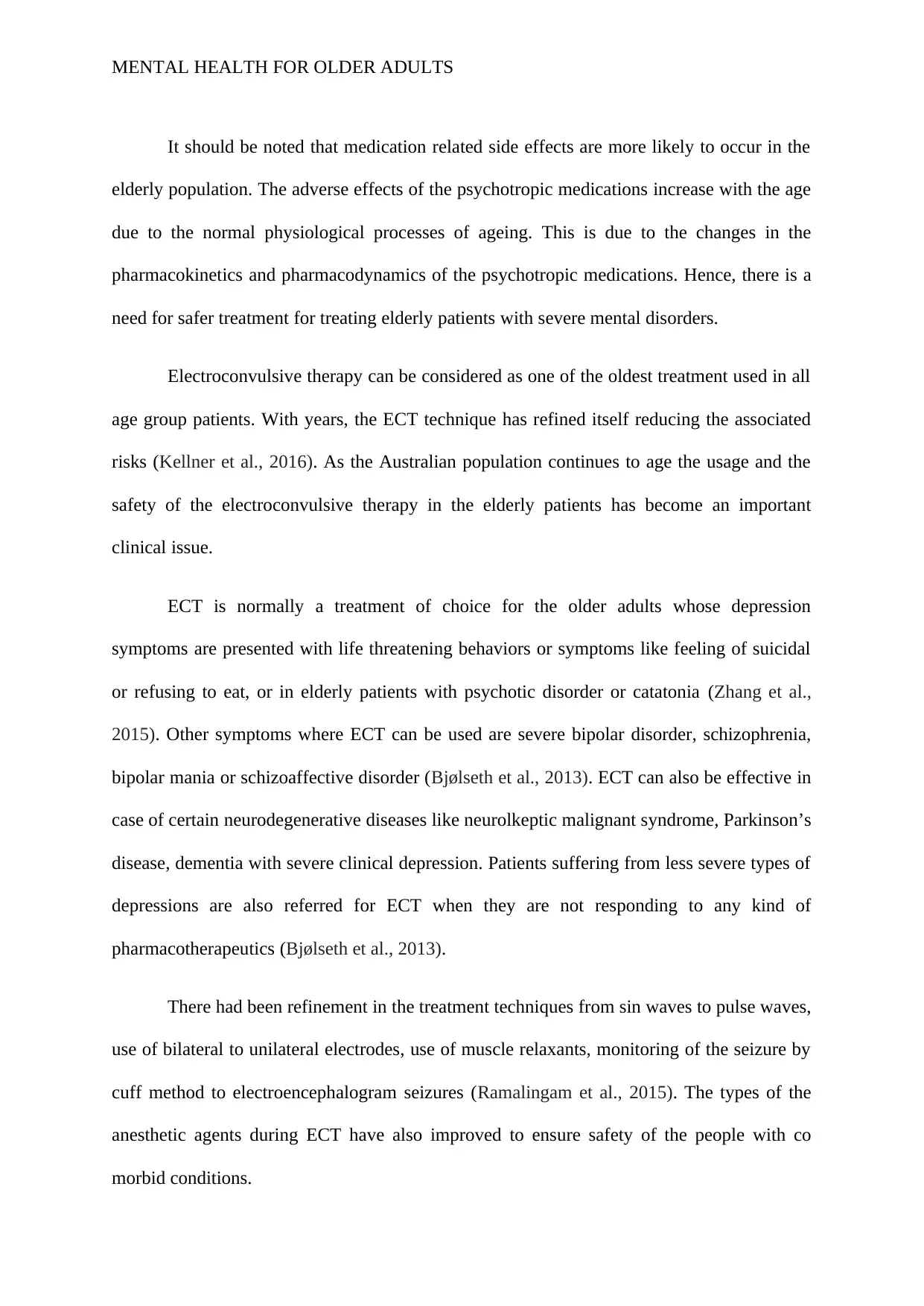
MENTAL HEALTH FOR OLDER ADULTS
It should be noted that medication related side effects are more likely to occur in the
elderly population. The adverse effects of the psychotropic medications increase with the age
due to the normal physiological processes of ageing. This is due to the changes in the
pharmacokinetics and pharmacodynamics of the psychotropic medications. Hence, there is a
need for safer treatment for treating elderly patients with severe mental disorders.
Electroconvulsive therapy can be considered as one of the oldest treatment used in all
age group patients. With years, the ECT technique has refined itself reducing the associated
risks (Kellner et al., 2016). As the Australian population continues to age the usage and the
safety of the electroconvulsive therapy in the elderly patients has become an important
clinical issue.
ECT is normally a treatment of choice for the older adults whose depression
symptoms are presented with life threatening behaviors or symptoms like feeling of suicidal
or refusing to eat, or in elderly patients with psychotic disorder or catatonia (Zhang et al.,
2015). Other symptoms where ECT can be used are severe bipolar disorder, schizophrenia,
bipolar mania or schizoaffective disorder (Bjølseth et al., 2013). ECT can also be effective in
case of certain neurodegenerative diseases like neurolkeptic malignant syndrome, Parkinson’s
disease, dementia with severe clinical depression. Patients suffering from less severe types of
depressions are also referred for ECT when they are not responding to any kind of
pharmacotherapeutics (Bjølseth et al., 2013).
There had been refinement in the treatment techniques from sin waves to pulse waves,
use of bilateral to unilateral electrodes, use of muscle relaxants, monitoring of the seizure by
cuff method to electroencephalogram seizures (Ramalingam et al., 2015). The types of the
anesthetic agents during ECT have also improved to ensure safety of the people with co
morbid conditions.
It should be noted that medication related side effects are more likely to occur in the
elderly population. The adverse effects of the psychotropic medications increase with the age
due to the normal physiological processes of ageing. This is due to the changes in the
pharmacokinetics and pharmacodynamics of the psychotropic medications. Hence, there is a
need for safer treatment for treating elderly patients with severe mental disorders.
Electroconvulsive therapy can be considered as one of the oldest treatment used in all
age group patients. With years, the ECT technique has refined itself reducing the associated
risks (Kellner et al., 2016). As the Australian population continues to age the usage and the
safety of the electroconvulsive therapy in the elderly patients has become an important
clinical issue.
ECT is normally a treatment of choice for the older adults whose depression
symptoms are presented with life threatening behaviors or symptoms like feeling of suicidal
or refusing to eat, or in elderly patients with psychotic disorder or catatonia (Zhang et al.,
2015). Other symptoms where ECT can be used are severe bipolar disorder, schizophrenia,
bipolar mania or schizoaffective disorder (Bjølseth et al., 2013). ECT can also be effective in
case of certain neurodegenerative diseases like neurolkeptic malignant syndrome, Parkinson’s
disease, dementia with severe clinical depression. Patients suffering from less severe types of
depressions are also referred for ECT when they are not responding to any kind of
pharmacotherapeutics (Bjølseth et al., 2013).
There had been refinement in the treatment techniques from sin waves to pulse waves,
use of bilateral to unilateral electrodes, use of muscle relaxants, monitoring of the seizure by
cuff method to electroencephalogram seizures (Ramalingam et al., 2015). The types of the
anesthetic agents during ECT have also improved to ensure safety of the people with co
morbid conditions.
Paraphrase This Document
Need a fresh take? Get an instant paraphrase of this document with our AI Paraphraser
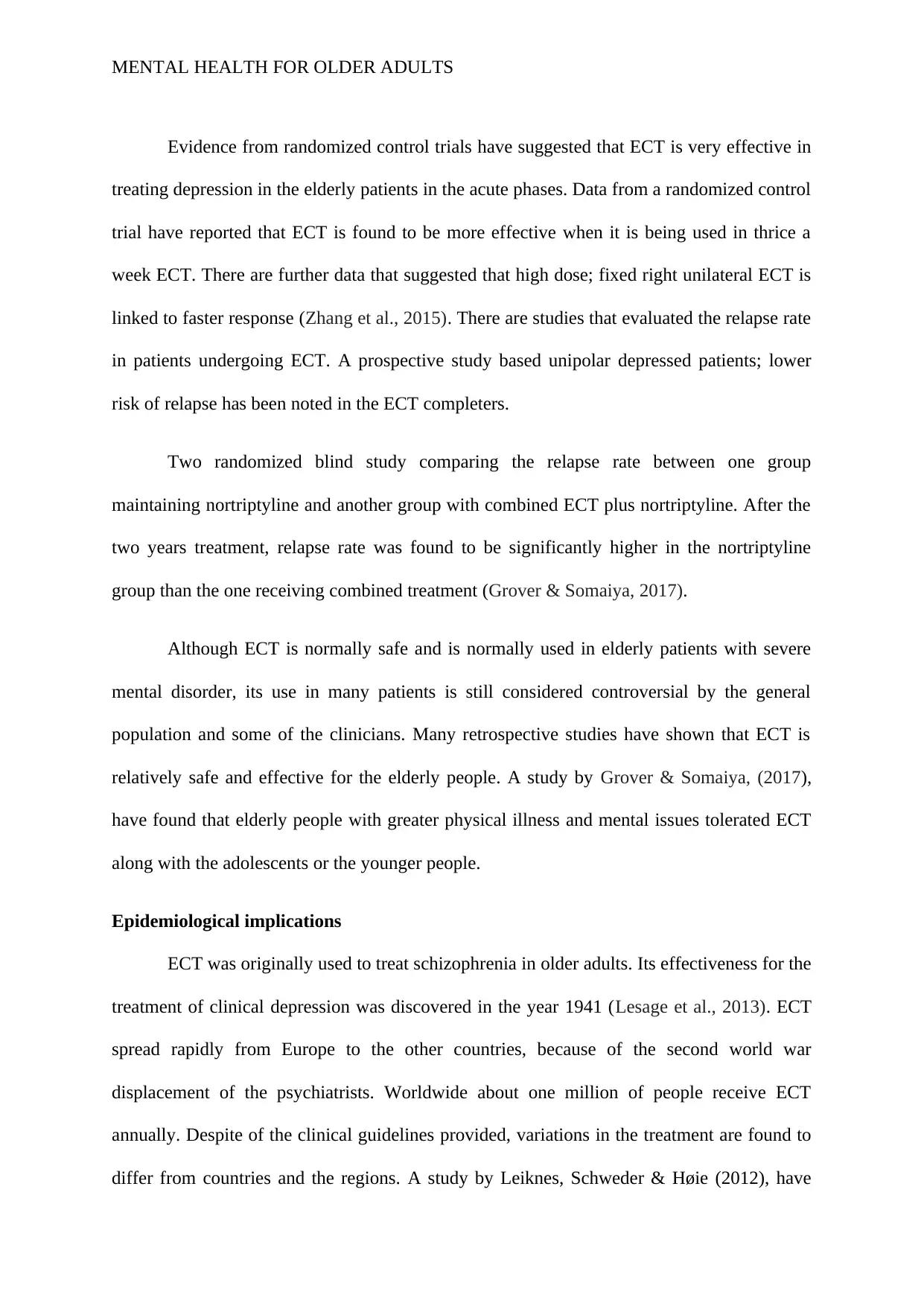
MENTAL HEALTH FOR OLDER ADULTS
Evidence from randomized control trials have suggested that ECT is very effective in
treating depression in the elderly patients in the acute phases. Data from a randomized control
trial have reported that ECT is found to be more effective when it is being used in thrice a
week ECT. There are further data that suggested that high dose; fixed right unilateral ECT is
linked to faster response (Zhang et al., 2015). There are studies that evaluated the relapse rate
in patients undergoing ECT. A prospective study based unipolar depressed patients; lower
risk of relapse has been noted in the ECT completers.
Two randomized blind study comparing the relapse rate between one group
maintaining nortriptyline and another group with combined ECT plus nortriptyline. After the
two years treatment, relapse rate was found to be significantly higher in the nortriptyline
group than the one receiving combined treatment (Grover & Somaiya, 2017).
Although ECT is normally safe and is normally used in elderly patients with severe
mental disorder, its use in many patients is still considered controversial by the general
population and some of the clinicians. Many retrospective studies have shown that ECT is
relatively safe and effective for the elderly people. A study by Grover & Somaiya, (2017),
have found that elderly people with greater physical illness and mental issues tolerated ECT
along with the adolescents or the younger people.
Epidemiological implications
ECT was originally used to treat schizophrenia in older adults. Its effectiveness for the
treatment of clinical depression was discovered in the year 1941 (Lesage et al., 2013). ECT
spread rapidly from Europe to the other countries, because of the second world war
displacement of the psychiatrists. Worldwide about one million of people receive ECT
annually. Despite of the clinical guidelines provided, variations in the treatment are found to
differ from countries and the regions. A study by Leiknes, Schweder & Høie (2012), have
Evidence from randomized control trials have suggested that ECT is very effective in
treating depression in the elderly patients in the acute phases. Data from a randomized control
trial have reported that ECT is found to be more effective when it is being used in thrice a
week ECT. There are further data that suggested that high dose; fixed right unilateral ECT is
linked to faster response (Zhang et al., 2015). There are studies that evaluated the relapse rate
in patients undergoing ECT. A prospective study based unipolar depressed patients; lower
risk of relapse has been noted in the ECT completers.
Two randomized blind study comparing the relapse rate between one group
maintaining nortriptyline and another group with combined ECT plus nortriptyline. After the
two years treatment, relapse rate was found to be significantly higher in the nortriptyline
group than the one receiving combined treatment (Grover & Somaiya, 2017).
Although ECT is normally safe and is normally used in elderly patients with severe
mental disorder, its use in many patients is still considered controversial by the general
population and some of the clinicians. Many retrospective studies have shown that ECT is
relatively safe and effective for the elderly people. A study by Grover & Somaiya, (2017),
have found that elderly people with greater physical illness and mental issues tolerated ECT
along with the adolescents or the younger people.
Epidemiological implications
ECT was originally used to treat schizophrenia in older adults. Its effectiveness for the
treatment of clinical depression was discovered in the year 1941 (Lesage et al., 2013). ECT
spread rapidly from Europe to the other countries, because of the second world war
displacement of the psychiatrists. Worldwide about one million of people receive ECT
annually. Despite of the clinical guidelines provided, variations in the treatment are found to
differ from countries and the regions. A study by Leiknes, Schweder & Høie (2012), have
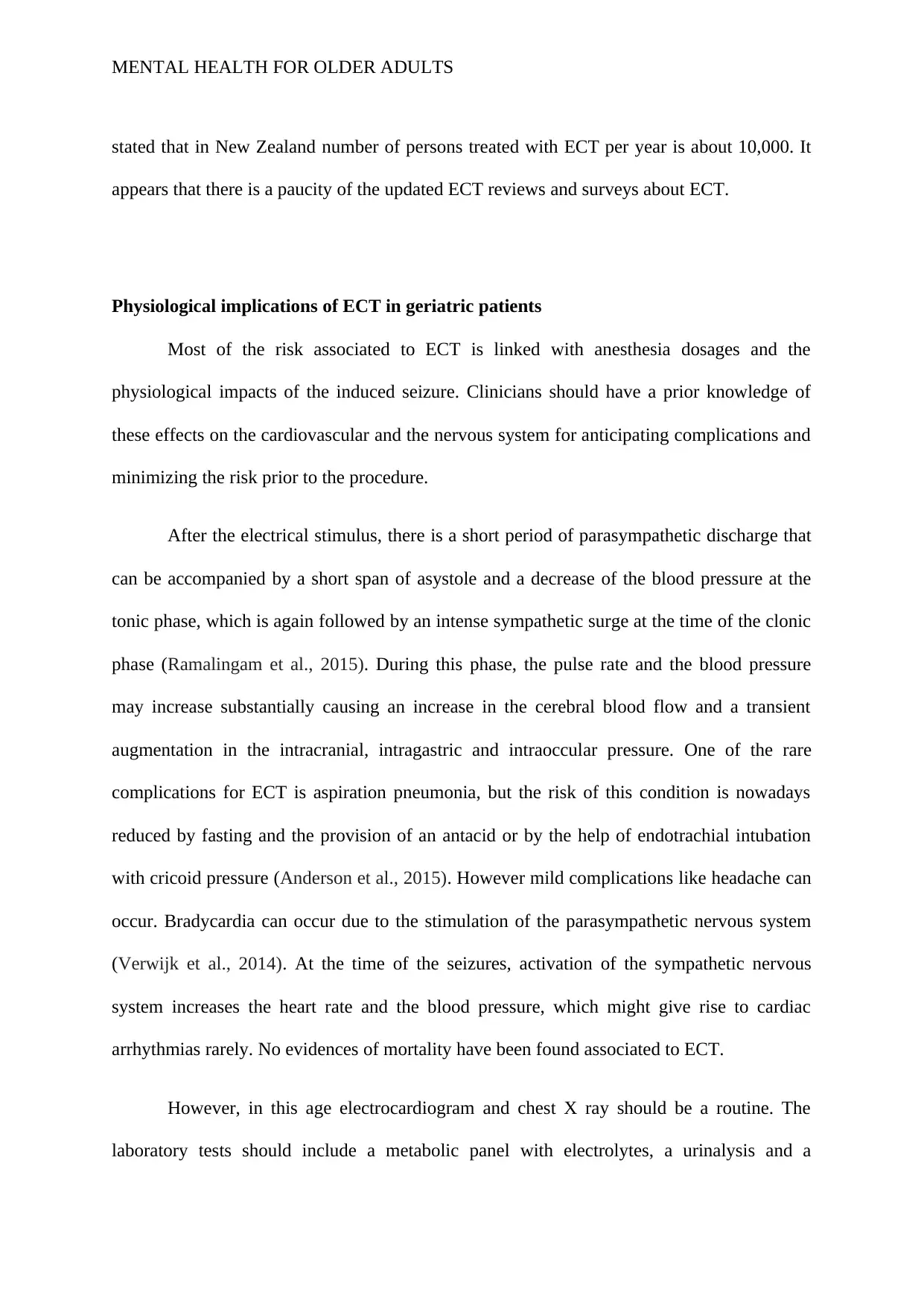
MENTAL HEALTH FOR OLDER ADULTS
stated that in New Zealand number of persons treated with ECT per year is about 10,000. It
appears that there is a paucity of the updated ECT reviews and surveys about ECT.
Physiological implications of ECT in geriatric patients
Most of the risk associated to ECT is linked with anesthesia dosages and the
physiological impacts of the induced seizure. Clinicians should have a prior knowledge of
these effects on the cardiovascular and the nervous system for anticipating complications and
minimizing the risk prior to the procedure.
After the electrical stimulus, there is a short period of parasympathetic discharge that
can be accompanied by a short span of asystole and a decrease of the blood pressure at the
tonic phase, which is again followed by an intense sympathetic surge at the time of the clonic
phase (Ramalingam et al., 2015). During this phase, the pulse rate and the blood pressure
may increase substantially causing an increase in the cerebral blood flow and a transient
augmentation in the intracranial, intragastric and intraoccular pressure. One of the rare
complications for ECT is aspiration pneumonia, but the risk of this condition is nowadays
reduced by fasting and the provision of an antacid or by the help of endotrachial intubation
with cricoid pressure (Anderson et al., 2015). However mild complications like headache can
occur. Bradycardia can occur due to the stimulation of the parasympathetic nervous system
(Verwijk et al., 2014). At the time of the seizures, activation of the sympathetic nervous
system increases the heart rate and the blood pressure, which might give rise to cardiac
arrhythmias rarely. No evidences of mortality have been found associated to ECT.
However, in this age electrocardiogram and chest X ray should be a routine. The
laboratory tests should include a metabolic panel with electrolytes, a urinalysis and a
stated that in New Zealand number of persons treated with ECT per year is about 10,000. It
appears that there is a paucity of the updated ECT reviews and surveys about ECT.
Physiological implications of ECT in geriatric patients
Most of the risk associated to ECT is linked with anesthesia dosages and the
physiological impacts of the induced seizure. Clinicians should have a prior knowledge of
these effects on the cardiovascular and the nervous system for anticipating complications and
minimizing the risk prior to the procedure.
After the electrical stimulus, there is a short period of parasympathetic discharge that
can be accompanied by a short span of asystole and a decrease of the blood pressure at the
tonic phase, which is again followed by an intense sympathetic surge at the time of the clonic
phase (Ramalingam et al., 2015). During this phase, the pulse rate and the blood pressure
may increase substantially causing an increase in the cerebral blood flow and a transient
augmentation in the intracranial, intragastric and intraoccular pressure. One of the rare
complications for ECT is aspiration pneumonia, but the risk of this condition is nowadays
reduced by fasting and the provision of an antacid or by the help of endotrachial intubation
with cricoid pressure (Anderson et al., 2015). However mild complications like headache can
occur. Bradycardia can occur due to the stimulation of the parasympathetic nervous system
(Verwijk et al., 2014). At the time of the seizures, activation of the sympathetic nervous
system increases the heart rate and the blood pressure, which might give rise to cardiac
arrhythmias rarely. No evidences of mortality have been found associated to ECT.
However, in this age electrocardiogram and chest X ray should be a routine. The
laboratory tests should include a metabolic panel with electrolytes, a urinalysis and a
⊘ This is a preview!⊘
Do you want full access?
Subscribe today to unlock all pages.

Trusted by 1+ million students worldwide
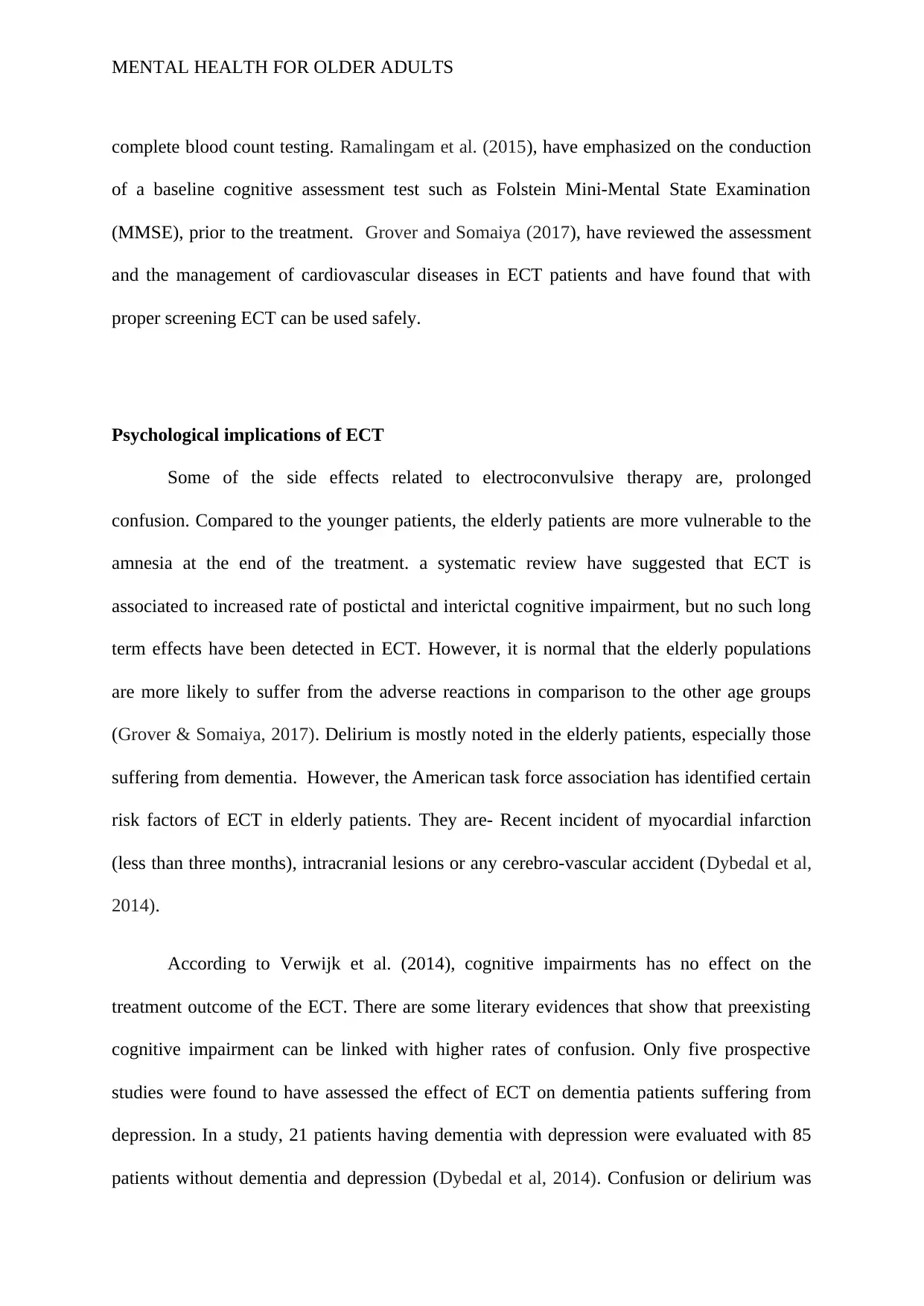
MENTAL HEALTH FOR OLDER ADULTS
complete blood count testing. Ramalingam et al. (2015), have emphasized on the conduction
of a baseline cognitive assessment test such as Folstein Mini-Mental State Examination
(MMSE), prior to the treatment. Grover and Somaiya (2017), have reviewed the assessment
and the management of cardiovascular diseases in ECT patients and have found that with
proper screening ECT can be used safely.
Psychological implications of ECT
Some of the side effects related to electroconvulsive therapy are, prolonged
confusion. Compared to the younger patients, the elderly patients are more vulnerable to the
amnesia at the end of the treatment. a systematic review have suggested that ECT is
associated to increased rate of postictal and interictal cognitive impairment, but no such long
term effects have been detected in ECT. However, it is normal that the elderly populations
are more likely to suffer from the adverse reactions in comparison to the other age groups
(Grover & Somaiya, 2017). Delirium is mostly noted in the elderly patients, especially those
suffering from dementia. However, the American task force association has identified certain
risk factors of ECT in elderly patients. They are- Recent incident of myocardial infarction
(less than three months), intracranial lesions or any cerebro-vascular accident (Dybedal et al,
2014).
According to Verwijk et al. (2014), cognitive impairments has no effect on the
treatment outcome of the ECT. There are some literary evidences that show that preexisting
cognitive impairment can be linked with higher rates of confusion. Only five prospective
studies were found to have assessed the effect of ECT on dementia patients suffering from
depression. In a study, 21 patients having dementia with depression were evaluated with 85
patients without dementia and depression (Dybedal et al, 2014). Confusion or delirium was
complete blood count testing. Ramalingam et al. (2015), have emphasized on the conduction
of a baseline cognitive assessment test such as Folstein Mini-Mental State Examination
(MMSE), prior to the treatment. Grover and Somaiya (2017), have reviewed the assessment
and the management of cardiovascular diseases in ECT patients and have found that with
proper screening ECT can be used safely.
Psychological implications of ECT
Some of the side effects related to electroconvulsive therapy are, prolonged
confusion. Compared to the younger patients, the elderly patients are more vulnerable to the
amnesia at the end of the treatment. a systematic review have suggested that ECT is
associated to increased rate of postictal and interictal cognitive impairment, but no such long
term effects have been detected in ECT. However, it is normal that the elderly populations
are more likely to suffer from the adverse reactions in comparison to the other age groups
(Grover & Somaiya, 2017). Delirium is mostly noted in the elderly patients, especially those
suffering from dementia. However, the American task force association has identified certain
risk factors of ECT in elderly patients. They are- Recent incident of myocardial infarction
(less than three months), intracranial lesions or any cerebro-vascular accident (Dybedal et al,
2014).
According to Verwijk et al. (2014), cognitive impairments has no effect on the
treatment outcome of the ECT. There are some literary evidences that show that preexisting
cognitive impairment can be linked with higher rates of confusion. Only five prospective
studies were found to have assessed the effect of ECT on dementia patients suffering from
depression. In a study, 21 patients having dementia with depression were evaluated with 85
patients without dementia and depression (Dybedal et al, 2014). Confusion or delirium was
Paraphrase This Document
Need a fresh take? Get an instant paraphrase of this document with our AI Paraphraser
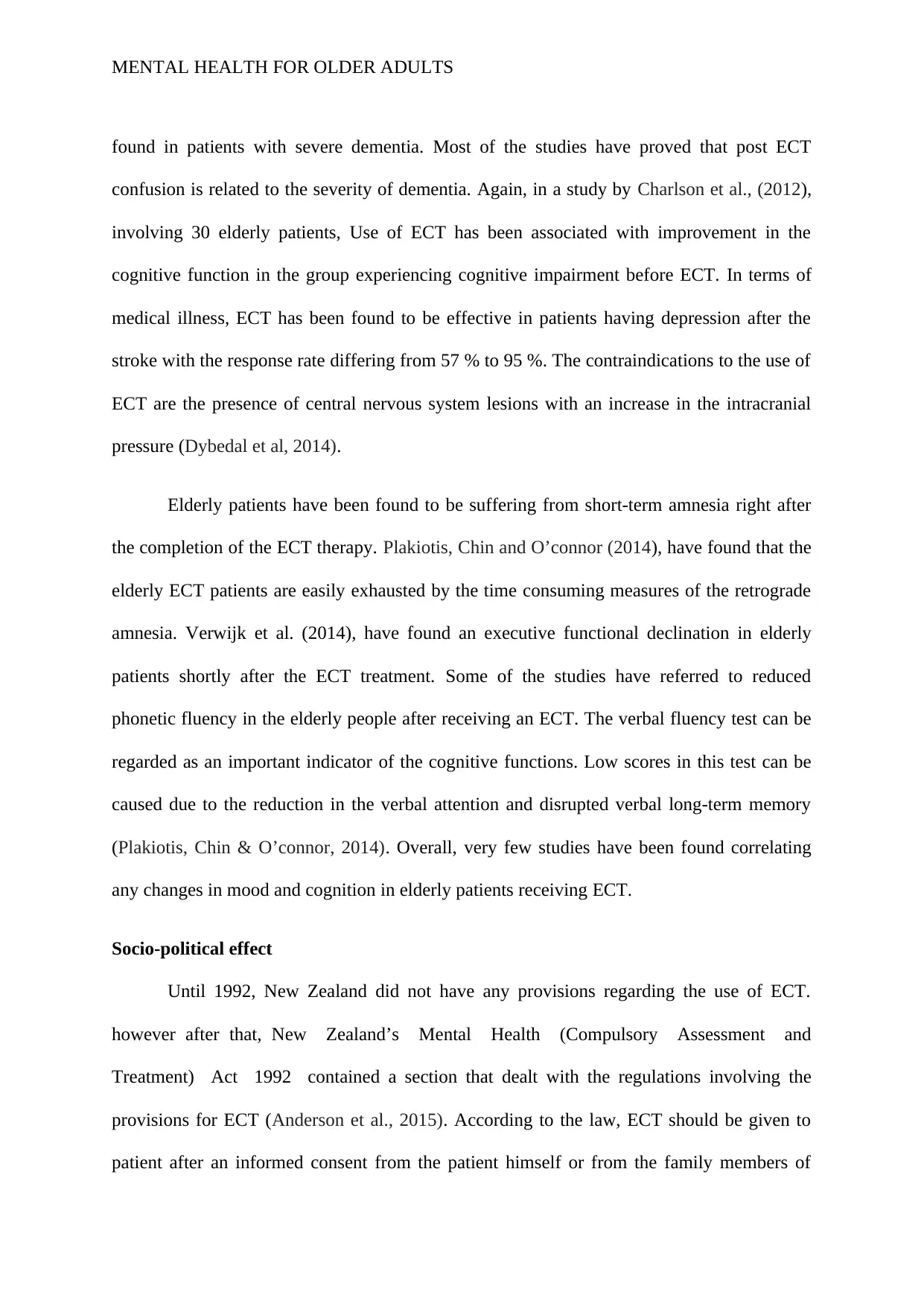
MENTAL HEALTH FOR OLDER ADULTS
found in patients with severe dementia. Most of the studies have proved that post ECT
confusion is related to the severity of dementia. Again, in a study by Charlson et al., (2012),
involving 30 elderly patients, Use of ECT has been associated with improvement in the
cognitive function in the group experiencing cognitive impairment before ECT. In terms of
medical illness, ECT has been found to be effective in patients having depression after the
stroke with the response rate differing from 57 % to 95 %. The contraindications to the use of
ECT are the presence of central nervous system lesions with an increase in the intracranial
pressure (Dybedal et al, 2014).
Elderly patients have been found to be suffering from short-term amnesia right after
the completion of the ECT therapy. Plakiotis, Chin and O’connor (2014), have found that the
elderly ECT patients are easily exhausted by the time consuming measures of the retrograde
amnesia. Verwijk et al. (2014), have found an executive functional declination in elderly
patients shortly after the ECT treatment. Some of the studies have referred to reduced
phonetic fluency in the elderly people after receiving an ECT. The verbal fluency test can be
regarded as an important indicator of the cognitive functions. Low scores in this test can be
caused due to the reduction in the verbal attention and disrupted verbal long-term memory
(Plakiotis, Chin & O’connor, 2014). Overall, very few studies have been found correlating
any changes in mood and cognition in elderly patients receiving ECT.
Socio-political effect
Until 1992, New Zealand did not have any provisions regarding the use of ECT.
however after that, New Zealand’s Mental Health (Compulsory Assessment and
Treatment) Act 1992 contained a section that dealt with the regulations involving the
provisions for ECT (Anderson et al., 2015). According to the law, ECT should be given to
patient after an informed consent from the patient himself or from the family members of
found in patients with severe dementia. Most of the studies have proved that post ECT
confusion is related to the severity of dementia. Again, in a study by Charlson et al., (2012),
involving 30 elderly patients, Use of ECT has been associated with improvement in the
cognitive function in the group experiencing cognitive impairment before ECT. In terms of
medical illness, ECT has been found to be effective in patients having depression after the
stroke with the response rate differing from 57 % to 95 %. The contraindications to the use of
ECT are the presence of central nervous system lesions with an increase in the intracranial
pressure (Dybedal et al, 2014).
Elderly patients have been found to be suffering from short-term amnesia right after
the completion of the ECT therapy. Plakiotis, Chin and O’connor (2014), have found that the
elderly ECT patients are easily exhausted by the time consuming measures of the retrograde
amnesia. Verwijk et al. (2014), have found an executive functional declination in elderly
patients shortly after the ECT treatment. Some of the studies have referred to reduced
phonetic fluency in the elderly people after receiving an ECT. The verbal fluency test can be
regarded as an important indicator of the cognitive functions. Low scores in this test can be
caused due to the reduction in the verbal attention and disrupted verbal long-term memory
(Plakiotis, Chin & O’connor, 2014). Overall, very few studies have been found correlating
any changes in mood and cognition in elderly patients receiving ECT.
Socio-political effect
Until 1992, New Zealand did not have any provisions regarding the use of ECT.
however after that, New Zealand’s Mental Health (Compulsory Assessment and
Treatment) Act 1992 contained a section that dealt with the regulations involving the
provisions for ECT (Anderson et al., 2015). According to the law, ECT should be given to
patient after an informed consent from the patient himself or from the family members of
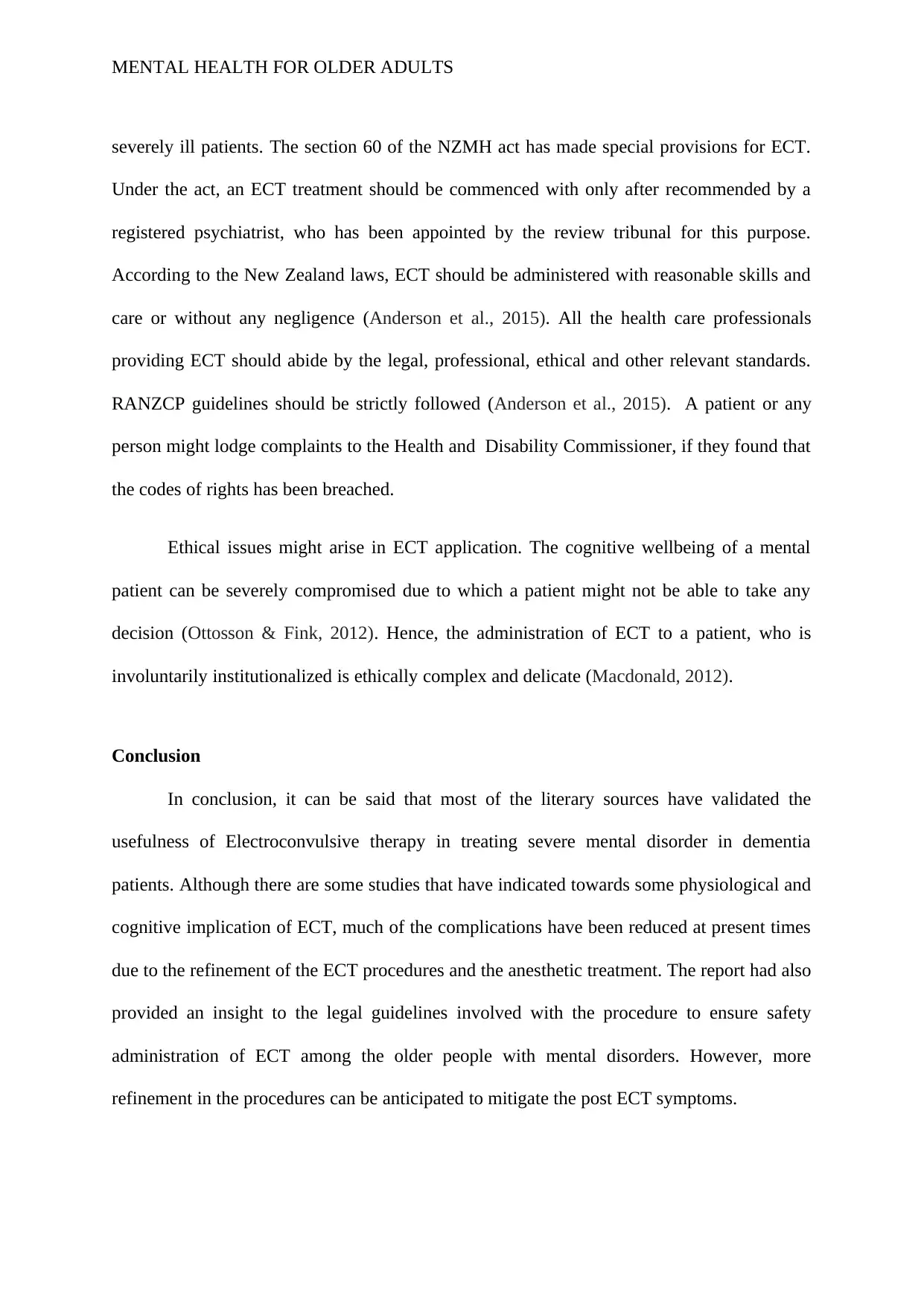
MENTAL HEALTH FOR OLDER ADULTS
severely ill patients. The section 60 of the NZMH act has made special provisions for ECT.
Under the act, an ECT treatment should be commenced with only after recommended by a
registered psychiatrist, who has been appointed by the review tribunal for this purpose.
According to the New Zealand laws, ECT should be administered with reasonable skills and
care or without any negligence (Anderson et al., 2015). All the health care professionals
providing ECT should abide by the legal, professional, ethical and other relevant standards.
RANZCP guidelines should be strictly followed (Anderson et al., 2015). A patient or any
person might lodge complaints to the Health and Disability Commissioner, if they found that
the codes of rights has been breached.
Ethical issues might arise in ECT application. The cognitive wellbeing of a mental
patient can be severely compromised due to which a patient might not be able to take any
decision (Ottosson & Fink, 2012). Hence, the administration of ECT to a patient, who is
involuntarily institutionalized is ethically complex and delicate (Macdonald, 2012).
Conclusion
In conclusion, it can be said that most of the literary sources have validated the
usefulness of Electroconvulsive therapy in treating severe mental disorder in dementia
patients. Although there are some studies that have indicated towards some physiological and
cognitive implication of ECT, much of the complications have been reduced at present times
due to the refinement of the ECT procedures and the anesthetic treatment. The report had also
provided an insight to the legal guidelines involved with the procedure to ensure safety
administration of ECT among the older people with mental disorders. However, more
refinement in the procedures can be anticipated to mitigate the post ECT symptoms.
severely ill patients. The section 60 of the NZMH act has made special provisions for ECT.
Under the act, an ECT treatment should be commenced with only after recommended by a
registered psychiatrist, who has been appointed by the review tribunal for this purpose.
According to the New Zealand laws, ECT should be administered with reasonable skills and
care or without any negligence (Anderson et al., 2015). All the health care professionals
providing ECT should abide by the legal, professional, ethical and other relevant standards.
RANZCP guidelines should be strictly followed (Anderson et al., 2015). A patient or any
person might lodge complaints to the Health and Disability Commissioner, if they found that
the codes of rights has been breached.
Ethical issues might arise in ECT application. The cognitive wellbeing of a mental
patient can be severely compromised due to which a patient might not be able to take any
decision (Ottosson & Fink, 2012). Hence, the administration of ECT to a patient, who is
involuntarily institutionalized is ethically complex and delicate (Macdonald, 2012).
Conclusion
In conclusion, it can be said that most of the literary sources have validated the
usefulness of Electroconvulsive therapy in treating severe mental disorder in dementia
patients. Although there are some studies that have indicated towards some physiological and
cognitive implication of ECT, much of the complications have been reduced at present times
due to the refinement of the ECT procedures and the anesthetic treatment. The report had also
provided an insight to the legal guidelines involved with the procedure to ensure safety
administration of ECT among the older people with mental disorders. However, more
refinement in the procedures can be anticipated to mitigate the post ECT symptoms.
⊘ This is a preview!⊘
Do you want full access?
Subscribe today to unlock all pages.

Trusted by 1+ million students worldwide
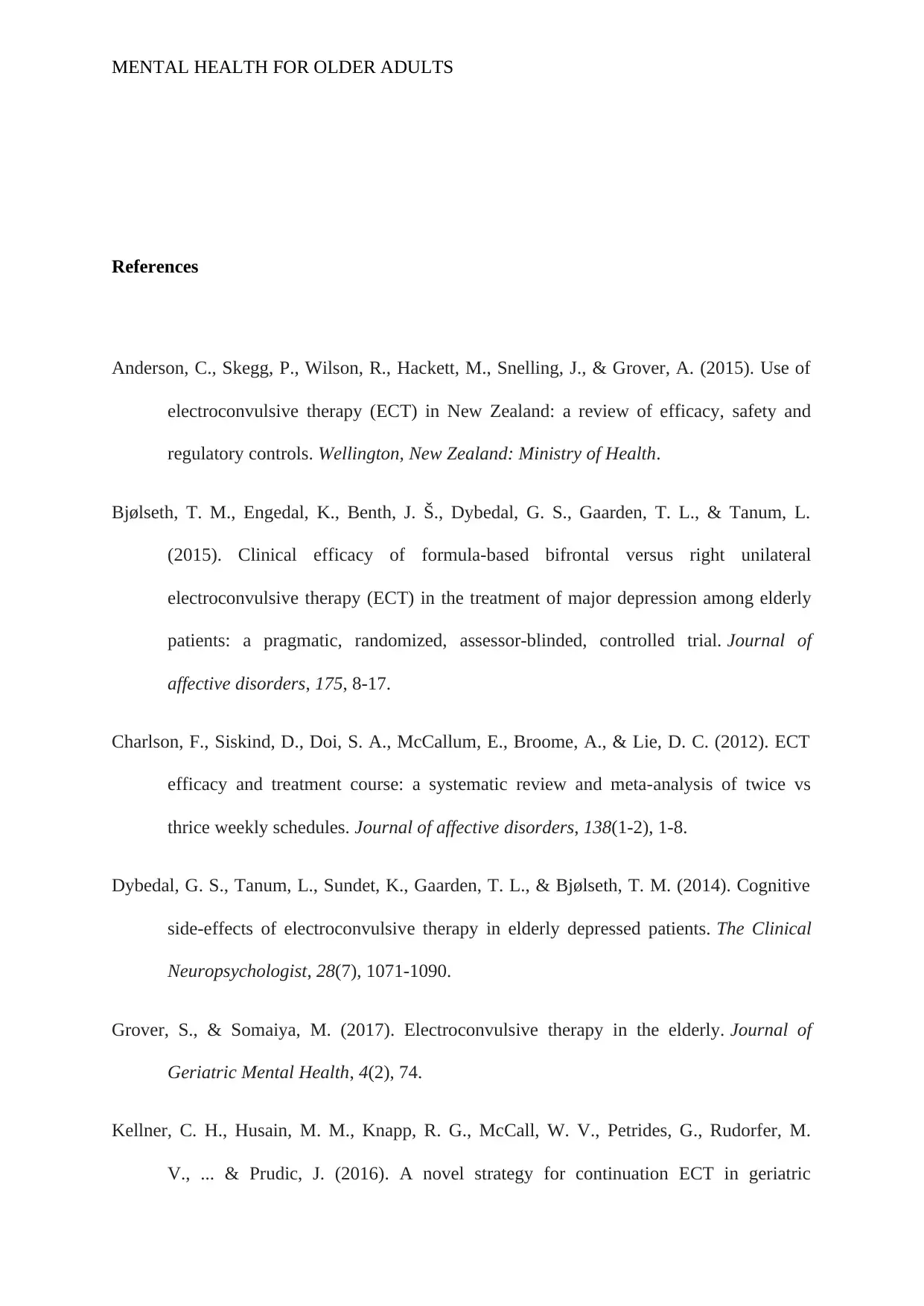
MENTAL HEALTH FOR OLDER ADULTS
References
Anderson, C., Skegg, P., Wilson, R., Hackett, M., Snelling, J., & Grover, A. (2015). Use of
electroconvulsive therapy (ECT) in New Zealand: a review of efficacy, safety and
regulatory controls. Wellington, New Zealand: Ministry of Health.
Bjølseth, T. M., Engedal, K., Benth, J. Š., Dybedal, G. S., Gaarden, T. L., & Tanum, L.
(2015). Clinical efficacy of formula-based bifrontal versus right unilateral
electroconvulsive therapy (ECT) in the treatment of major depression among elderly
patients: a pragmatic, randomized, assessor-blinded, controlled trial. Journal of
affective disorders, 175, 8-17.
Charlson, F., Siskind, D., Doi, S. A., McCallum, E., Broome, A., & Lie, D. C. (2012). ECT
efficacy and treatment course: a systematic review and meta-analysis of twice vs
thrice weekly schedules. Journal of affective disorders, 138(1-2), 1-8.
Dybedal, G. S., Tanum, L., Sundet, K., Gaarden, T. L., & Bjølseth, T. M. (2014). Cognitive
side-effects of electroconvulsive therapy in elderly depressed patients. The Clinical
Neuropsychologist, 28(7), 1071-1090.
Grover, S., & Somaiya, M. (2017). Electroconvulsive therapy in the elderly. Journal of
Geriatric Mental Health, 4(2), 74.
Kellner, C. H., Husain, M. M., Knapp, R. G., McCall, W. V., Petrides, G., Rudorfer, M.
V., ... & Prudic, J. (2016). A novel strategy for continuation ECT in geriatric
References
Anderson, C., Skegg, P., Wilson, R., Hackett, M., Snelling, J., & Grover, A. (2015). Use of
electroconvulsive therapy (ECT) in New Zealand: a review of efficacy, safety and
regulatory controls. Wellington, New Zealand: Ministry of Health.
Bjølseth, T. M., Engedal, K., Benth, J. Š., Dybedal, G. S., Gaarden, T. L., & Tanum, L.
(2015). Clinical efficacy of formula-based bifrontal versus right unilateral
electroconvulsive therapy (ECT) in the treatment of major depression among elderly
patients: a pragmatic, randomized, assessor-blinded, controlled trial. Journal of
affective disorders, 175, 8-17.
Charlson, F., Siskind, D., Doi, S. A., McCallum, E., Broome, A., & Lie, D. C. (2012). ECT
efficacy and treatment course: a systematic review and meta-analysis of twice vs
thrice weekly schedules. Journal of affective disorders, 138(1-2), 1-8.
Dybedal, G. S., Tanum, L., Sundet, K., Gaarden, T. L., & Bjølseth, T. M. (2014). Cognitive
side-effects of electroconvulsive therapy in elderly depressed patients. The Clinical
Neuropsychologist, 28(7), 1071-1090.
Grover, S., & Somaiya, M. (2017). Electroconvulsive therapy in the elderly. Journal of
Geriatric Mental Health, 4(2), 74.
Kellner, C. H., Husain, M. M., Knapp, R. G., McCall, W. V., Petrides, G., Rudorfer, M.
V., ... & Prudic, J. (2016). A novel strategy for continuation ECT in geriatric
Paraphrase This Document
Need a fresh take? Get an instant paraphrase of this document with our AI Paraphraser
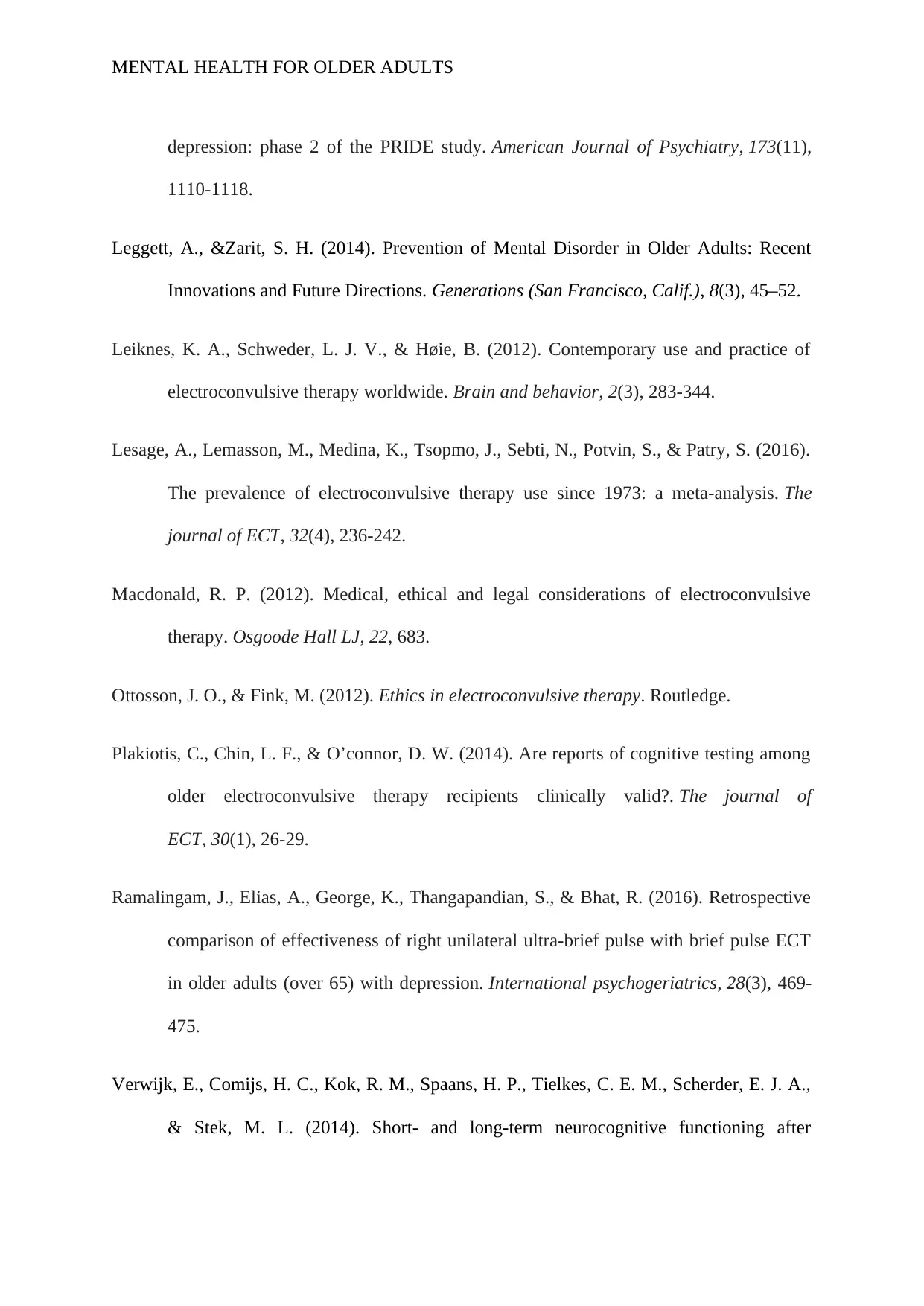
MENTAL HEALTH FOR OLDER ADULTS
depression: phase 2 of the PRIDE study. American Journal of Psychiatry, 173(11),
1110-1118.
Leggett, A., &Zarit, S. H. (2014). Prevention of Mental Disorder in Older Adults: Recent
Innovations and Future Directions. Generations (San Francisco, Calif.), 8(3), 45–52.
Leiknes, K. A., Schweder, L. J. V., & Høie, B. (2012). Contemporary use and practice of
electroconvulsive therapy worldwide. Brain and behavior, 2(3), 283-344.
Lesage, A., Lemasson, M., Medina, K., Tsopmo, J., Sebti, N., Potvin, S., & Patry, S. (2016).
The prevalence of electroconvulsive therapy use since 1973: a meta-analysis. The
journal of ECT, 32(4), 236-242.
Macdonald, R. P. (2012). Medical, ethical and legal considerations of electroconvulsive
therapy. Osgoode Hall LJ, 22, 683.
Ottosson, J. O., & Fink, M. (2012). Ethics in electroconvulsive therapy. Routledge.
Plakiotis, C., Chin, L. F., & O’connor, D. W. (2014). Are reports of cognitive testing among
older electroconvulsive therapy recipients clinically valid?. The journal of
ECT, 30(1), 26-29.
Ramalingam, J., Elias, A., George, K., Thangapandian, S., & Bhat, R. (2016). Retrospective
comparison of effectiveness of right unilateral ultra-brief pulse with brief pulse ECT
in older adults (over 65) with depression. International psychogeriatrics, 28(3), 469-
475.
Verwijk, E., Comijs, H. C., Kok, R. M., Spaans, H. P., Tielkes, C. E. M., Scherder, E. J. A.,
& Stek, M. L. (2014). Short- and long-term neurocognitive functioning after
depression: phase 2 of the PRIDE study. American Journal of Psychiatry, 173(11),
1110-1118.
Leggett, A., &Zarit, S. H. (2014). Prevention of Mental Disorder in Older Adults: Recent
Innovations and Future Directions. Generations (San Francisco, Calif.), 8(3), 45–52.
Leiknes, K. A., Schweder, L. J. V., & Høie, B. (2012). Contemporary use and practice of
electroconvulsive therapy worldwide. Brain and behavior, 2(3), 283-344.
Lesage, A., Lemasson, M., Medina, K., Tsopmo, J., Sebti, N., Potvin, S., & Patry, S. (2016).
The prevalence of electroconvulsive therapy use since 1973: a meta-analysis. The
journal of ECT, 32(4), 236-242.
Macdonald, R. P. (2012). Medical, ethical and legal considerations of electroconvulsive
therapy. Osgoode Hall LJ, 22, 683.
Ottosson, J. O., & Fink, M. (2012). Ethics in electroconvulsive therapy. Routledge.
Plakiotis, C., Chin, L. F., & O’connor, D. W. (2014). Are reports of cognitive testing among
older electroconvulsive therapy recipients clinically valid?. The journal of
ECT, 30(1), 26-29.
Ramalingam, J., Elias, A., George, K., Thangapandian, S., & Bhat, R. (2016). Retrospective
comparison of effectiveness of right unilateral ultra-brief pulse with brief pulse ECT
in older adults (over 65) with depression. International psychogeriatrics, 28(3), 469-
475.
Verwijk, E., Comijs, H. C., Kok, R. M., Spaans, H. P., Tielkes, C. E. M., Scherder, E. J. A.,
& Stek, M. L. (2014). Short- and long-term neurocognitive functioning after
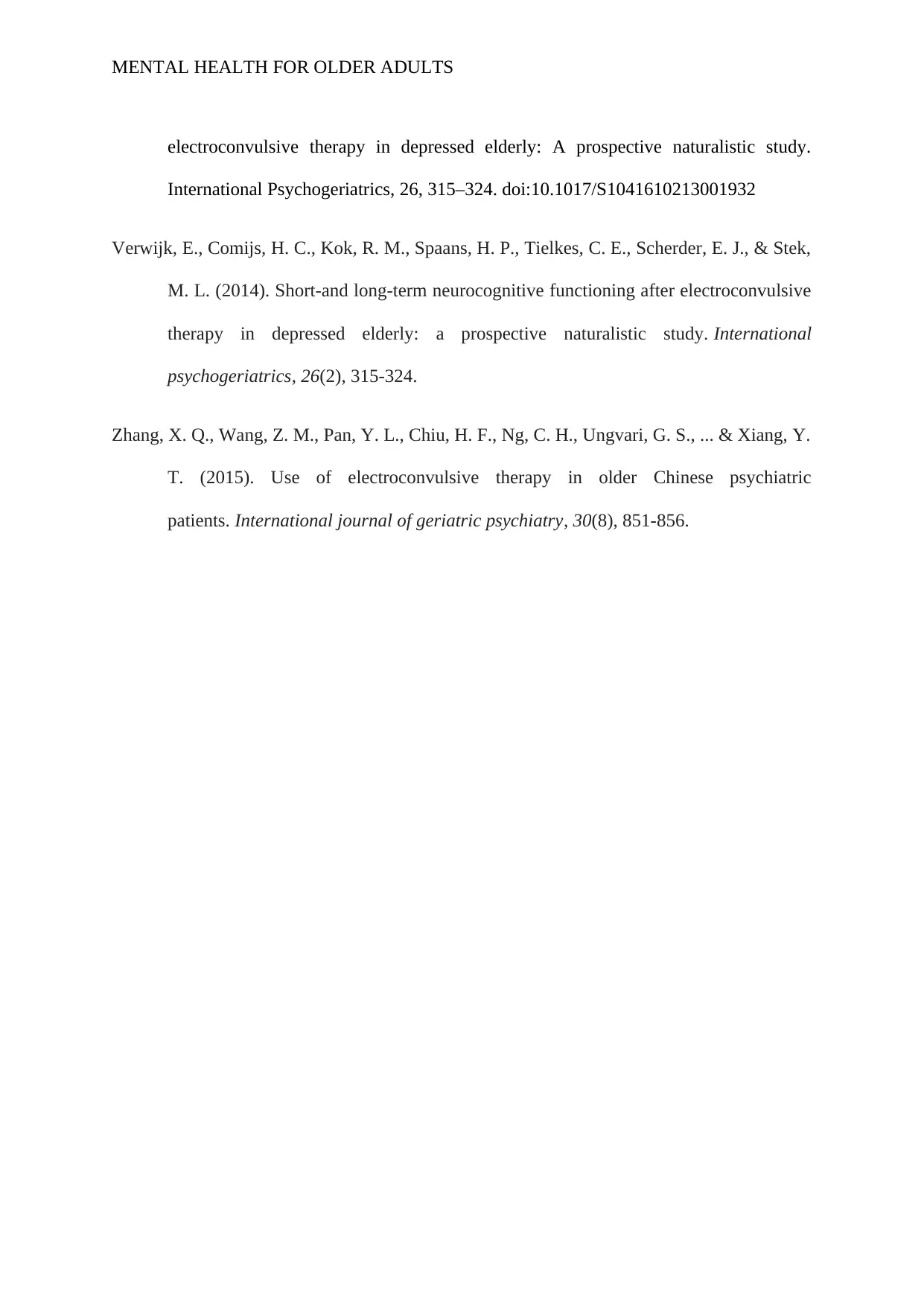
MENTAL HEALTH FOR OLDER ADULTS
electroconvulsive therapy in depressed elderly: A prospective naturalistic study.
International Psychogeriatrics, 26, 315–324. doi:10.1017/S1041610213001932
Verwijk, E., Comijs, H. C., Kok, R. M., Spaans, H. P., Tielkes, C. E., Scherder, E. J., & Stek,
M. L. (2014). Short-and long-term neurocognitive functioning after electroconvulsive
therapy in depressed elderly: a prospective naturalistic study. International
psychogeriatrics, 26(2), 315-324.
Zhang, X. Q., Wang, Z. M., Pan, Y. L., Chiu, H. F., Ng, C. H., Ungvari, G. S., ... & Xiang, Y.
T. (2015). Use of electroconvulsive therapy in older Chinese psychiatric
patients. International journal of geriatric psychiatry, 30(8), 851-856.
electroconvulsive therapy in depressed elderly: A prospective naturalistic study.
International Psychogeriatrics, 26, 315–324. doi:10.1017/S1041610213001932
Verwijk, E., Comijs, H. C., Kok, R. M., Spaans, H. P., Tielkes, C. E., Scherder, E. J., & Stek,
M. L. (2014). Short-and long-term neurocognitive functioning after electroconvulsive
therapy in depressed elderly: a prospective naturalistic study. International
psychogeriatrics, 26(2), 315-324.
Zhang, X. Q., Wang, Z. M., Pan, Y. L., Chiu, H. F., Ng, C. H., Ungvari, G. S., ... & Xiang, Y.
T. (2015). Use of electroconvulsive therapy in older Chinese psychiatric
patients. International journal of geriatric psychiatry, 30(8), 851-856.
⊘ This is a preview!⊘
Do you want full access?
Subscribe today to unlock all pages.

Trusted by 1+ million students worldwide
1 out of 12
Related Documents
Your All-in-One AI-Powered Toolkit for Academic Success.
+13062052269
info@desklib.com
Available 24*7 on WhatsApp / Email
![[object Object]](/_next/static/media/star-bottom.7253800d.svg)
Unlock your academic potential
Copyright © 2020–2026 A2Z Services. All Rights Reserved. Developed and managed by ZUCOL.





